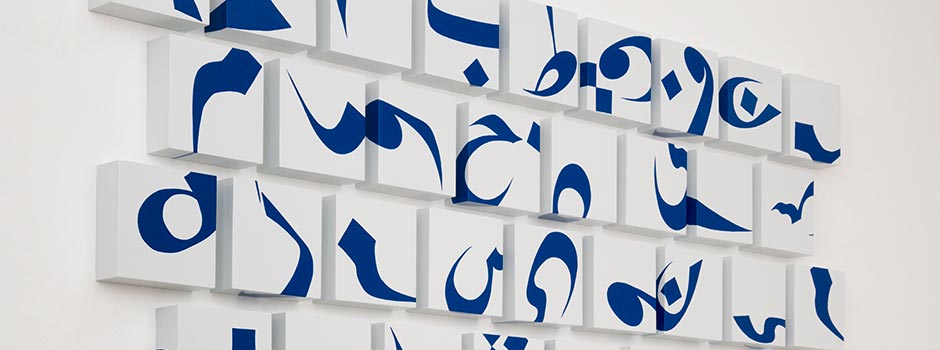
AN INTERVIEW WITH IRANIAN-BORN, NEW YORK ARTIST POURAN JINCHI The Deconstruction of Calligraphy and the Deeper Complexity of the Written Word
Sep 21, 2013 Interview

Pouran Jinchi is an Iranian-born, New York artist who borrows from her home culture's traditions of literature and calligraphy to pursue her own aesthetic explorations. Having been trained in traditional calligraphy, she finds the relation between words and forms, natural or non-objective, deeply intertwined. Pouran Jinchi is currently having her third solo show ‘The Blind Owl’ (September 18 - October 24, 2013) at The Third Line (Dubai). In this interview Pouran Jinchi shared with us her thoughts about her work and her current exhibition.
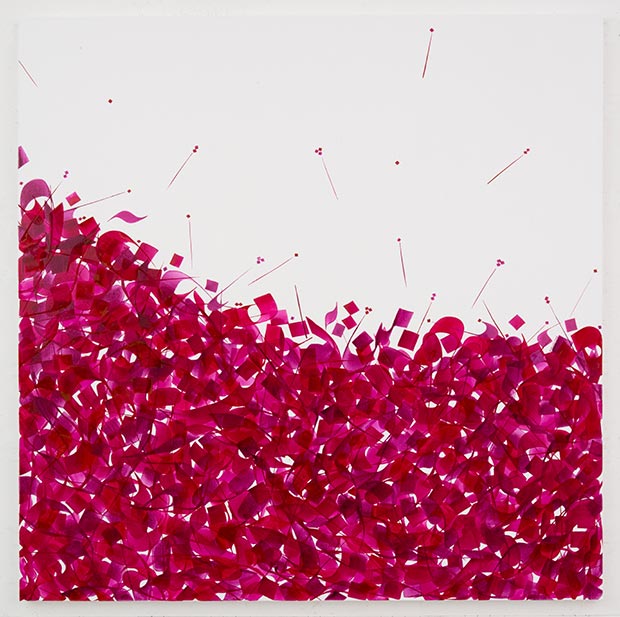 Pouran Jinchi / Pink Painting (The Blind Owl Series), 2013, Ink on Canvas, 122x122 cm / Courtesy of the Artist and The Third Line
Pouran Jinchi / Pink Painting (The Blind Owl Series), 2013, Ink on Canvas, 122x122 cm / Courtesy of the Artist and The Third Line
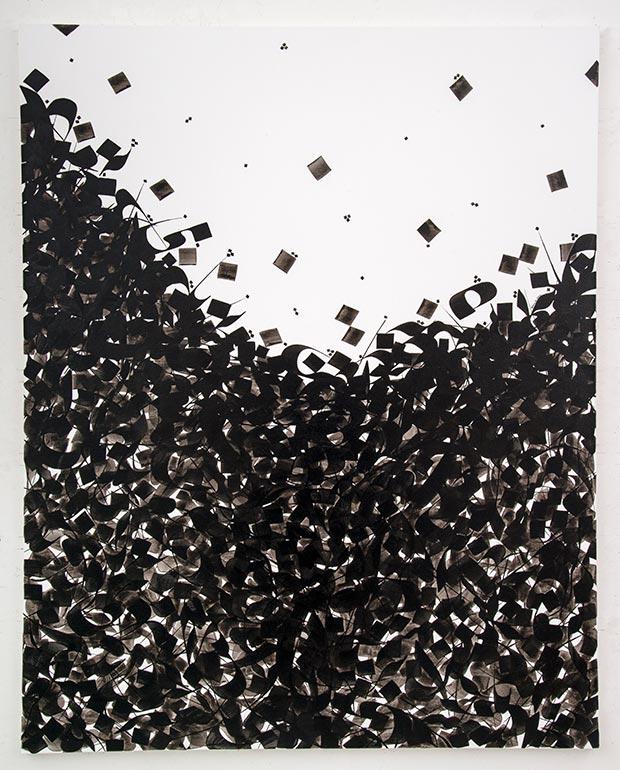 Pouran Jinchi / Black Painting (The Blind Owl Series), 2013, Ink on Canvas, 152,4x122 cm / Courtesy of the Artist and The Third Line
Pouran Jinchi / Black Painting (The Blind Owl Series), 2013, Ink on Canvas, 152,4x122 cm / Courtesy of the Artist and The Third Line
My work is very detailed, so it is only demanding in a sense of physicality. As far as merging the two worlds, I must say it comes very naturally and unconsciously. I believe it should not be forced and when it feels right, the two worlds merge without much effort. The traditional influences are already exciting in the brain, archival and the contemporary influences add on every day by observations and life experiences.
In my work, it is important since I can’t break the calligraphy rules without knowing the fundamental rules of traditional calligraphy. I would have had no starting point for my art form if I did not know how the traditional calligraphy works. I learned traditional calligraphy as a young child and without that knowledge I would not be the artist I am today. My art is a reflective of my life experiences from childhood to now. It is fascinating how art is the fruit of the artist's life experience and labor. The artist is the loving gardener tending to the tree in hope of a perfect fruit.
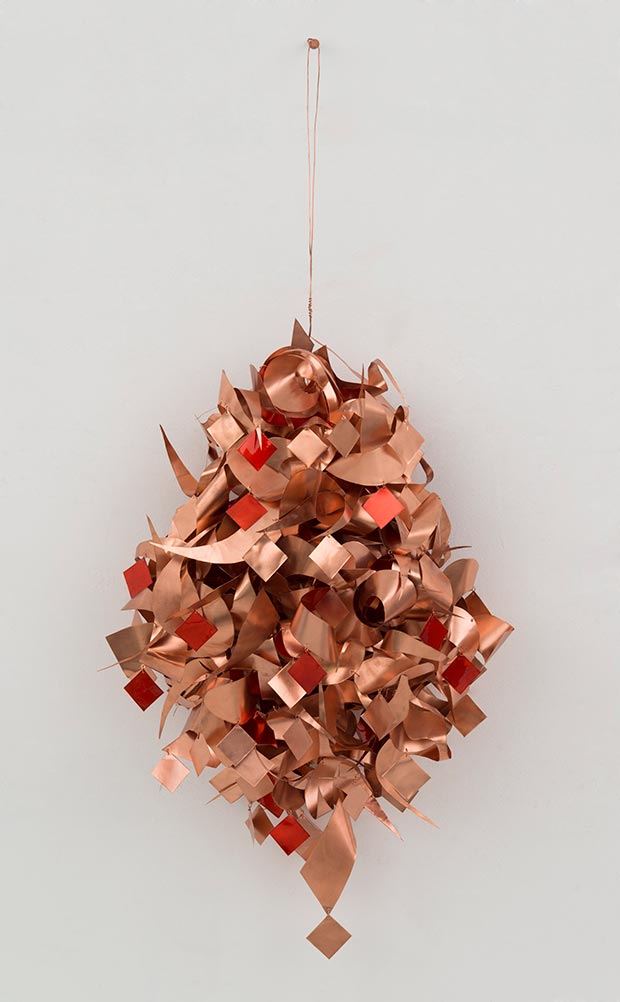 Pouran Jinchi / Untitled #3 (The Blind Owl Series), 2013, Copper and Paint, 104x43x25.4 cm / Courtesy of the Artist and The Third Line
Pouran Jinchi / Untitled #3 (The Blind Owl Series), 2013, Copper and Paint, 104x43x25.4 cm / Courtesy of the Artist and The Third Line
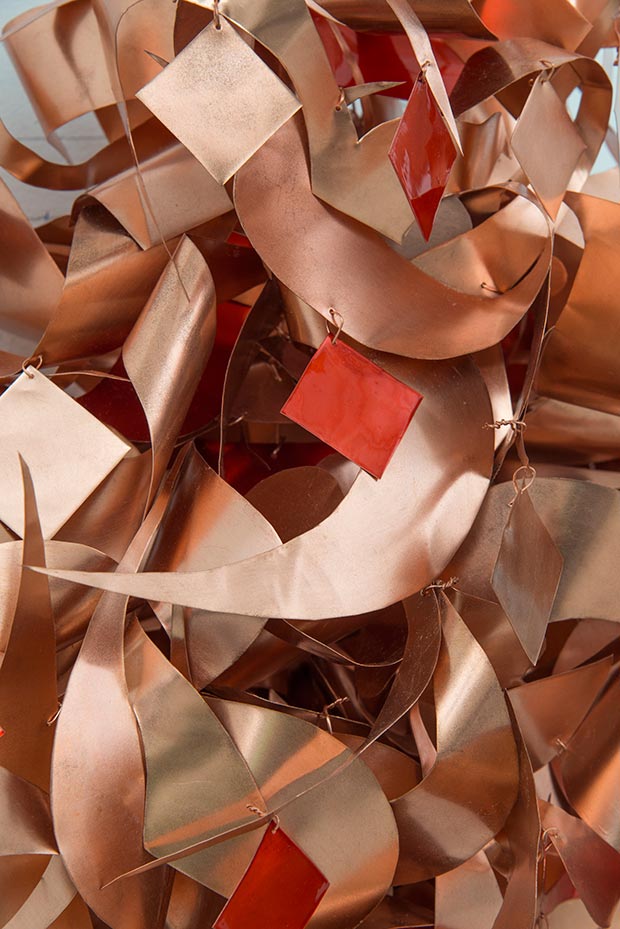 Pouran Jinchi / Untitled #3 (The Blind Owl Series), 2013, Copper and Paint, 104x43x25.4 cm, detail / Courtesy of the Artist and The Third Line
Pouran Jinchi / Untitled #3 (The Blind Owl Series), 2013, Copper and Paint, 104x43x25.4 cm, detail / Courtesy of the Artist and The Third Line
I like to experiment and challenge my art form, to avoid boredom. I always try to be consistent with my style, but stray to discover new ways of doing my art. I need to experience my work in different perspectives and materials to battle boredom and strive for mastery.
I always choose the text first and then I choose the material. The text always has to speak to me at some level, emotional, nostalgia, memory, making a statement. For example, in the exhibit ‘The Blind Owl’, the choice of text was totally a direct result of dealing with a personal loss. The book is about death or endings and a recent personal experience brought me to this book.
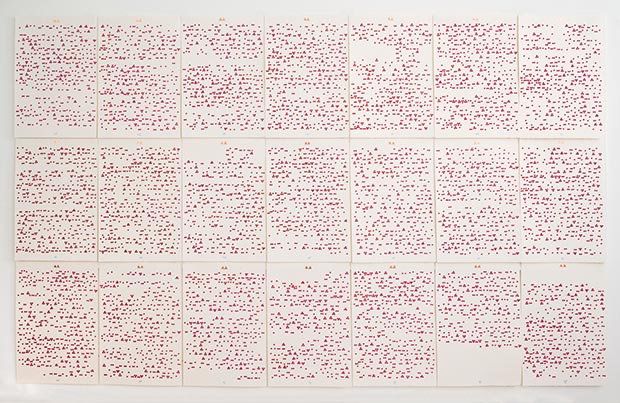 Pouran Jinchi / Dots (The Blind Owl Series), 2013, Ink and Copper on paper, 95 pieces, 56.5x38 cm, detail / Courtesy of the Artist and The Third Line
Pouran Jinchi / Dots (The Blind Owl Series), 2013, Ink and Copper on paper, 95 pieces, 56.5x38 cm, detail / Courtesy of the Artist and The Third Line
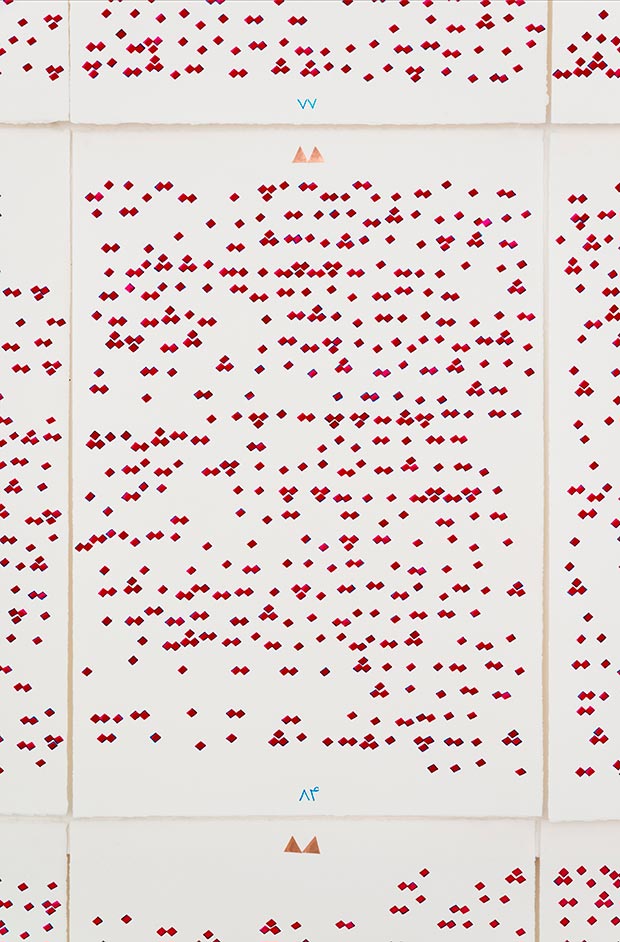 Pouran Jinchi / Dots (The Blind Owl Series), 2013, Ink and Copper on paper, 95 pieces, 56.5x38 cm, detail / Courtesy of the Artist and The Third Line
Pouran Jinchi / Dots (The Blind Owl Series), 2013, Ink and Copper on paper, 95 pieces, 56.5x38 cm, detail / Courtesy of the Artist and The Third Line
_2013.jpg) Pouran Jinchi / The Blind Owl (Pattern), 2013, Pens and copper on Shojoshi paper, 71 pieces, 25.4x36.8 cm / Courtesy of the Artist and The Third Line
Pouran Jinchi / The Blind Owl (Pattern), 2013, Pens and copper on Shojoshi paper, 71 pieces, 25.4x36.8 cm / Courtesy of the Artist and The Third Line
_2013_Detail1.jpg) Pouran Jinchi / The Blind Owl (Pattern), 2013, Pens and copper on Shojoshi paper, 71 pieces, 25.4x36.8 cm, detail / Courtesy of the Artist and The Third Line
Pouran Jinchi / The Blind Owl (Pattern), 2013, Pens and copper on Shojoshi paper, 71 pieces, 25.4x36.8 cm, detail / Courtesy of the Artist and The Third Line
_2013_Detail2.jpg) Pouran Jinchi / The Blind Owl (Pattern), 2013, Pens and copper on Shojoshi paper, 71 pieces, 25.4x36.8 cm, detail / Courtesy of the Artist and The Third Line
Pouran Jinchi / The Blind Owl (Pattern), 2013, Pens and copper on Shojoshi paper, 71 pieces, 25.4x36.8 cm, detail / Courtesy of the Artist and The Third Line
_2013_Detail3.jpg) Pouran Jinchi / The Blind Owl (Pattern), 2013, Pens and copper on Shojoshi paper, 71 pieces, 25.4x36.8 cm, detail / Courtesy of the Artist and The Third Line
Pouran Jinchi / The Blind Owl (Pattern), 2013, Pens and copper on Shojoshi paper, 71 pieces, 25.4x36.8 cm, detail / Courtesy of the Artist and The Third Line
_2013_Detail4.JPG)
For some it can be a symbolic meaning, but for me it is only an interpretation. The technicality of calligraphy in already ingrained in my artistic skills, what is left is not the mechanics but the interpretation of it.
The Blind Owl is a book written by Sadegh Hedayat, a modern Iranian writer. I chose that book because I have a lot of memory associated with the book as a teenager and I wanted to express a certain emotion by the choice of the book. By choosing this book, I am allowing the book to speak for me and I interpreted the text through my art form and material. In so many words, my art becomes a vehicle for the book and the book becomes a vehicle of that certain emotion I mentioned earlier.
In this show you can experience a quote from the book or the whole book by variety of materials since I wanted to express it in as many ways as I possibly could.
_2013_01.jpg) Pouran Jinchi / The Blind Owl (Purple), 2013, Ink on paper, 71 pieces, 12x13.3 cm each / Courtesy of the Artist and The Third Line
Pouran Jinchi / The Blind Owl (Purple), 2013, Ink on paper, 71 pieces, 12x13.3 cm each / Courtesy of the Artist and The Third Line
_2013_Side_view.jpg) Pouran Jinchi / The Blind Owl (Purple), 2013, Ink on paper, side view / Courtesy of the Artist and The Third Line
Pouran Jinchi / The Blind Owl (Purple), 2013, Ink on paper, side view / Courtesy of the Artist and The Third Line
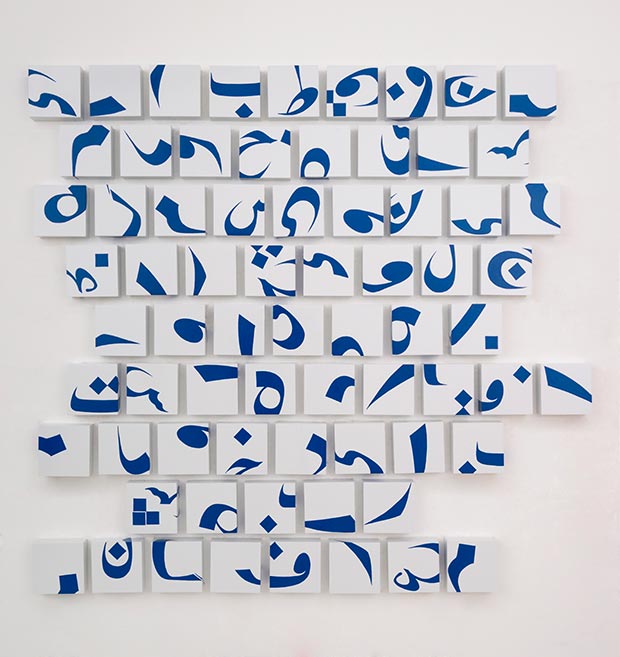 Pouran Jinchi / Untitled #1 (The Blind Owl Series), 2013, Enamel on Panel, 71 pieces, 15.2x15.2x5.4 cm each, aprox. 157.5x157.5 cm overall / Courtesy of the Artist and The Third Line
Pouran Jinchi / Untitled #1 (The Blind Owl Series), 2013, Enamel on Panel, 71 pieces, 15.2x15.2x5.4 cm each, aprox. 157.5x157.5 cm overall / Courtesy of the Artist and The Third Line
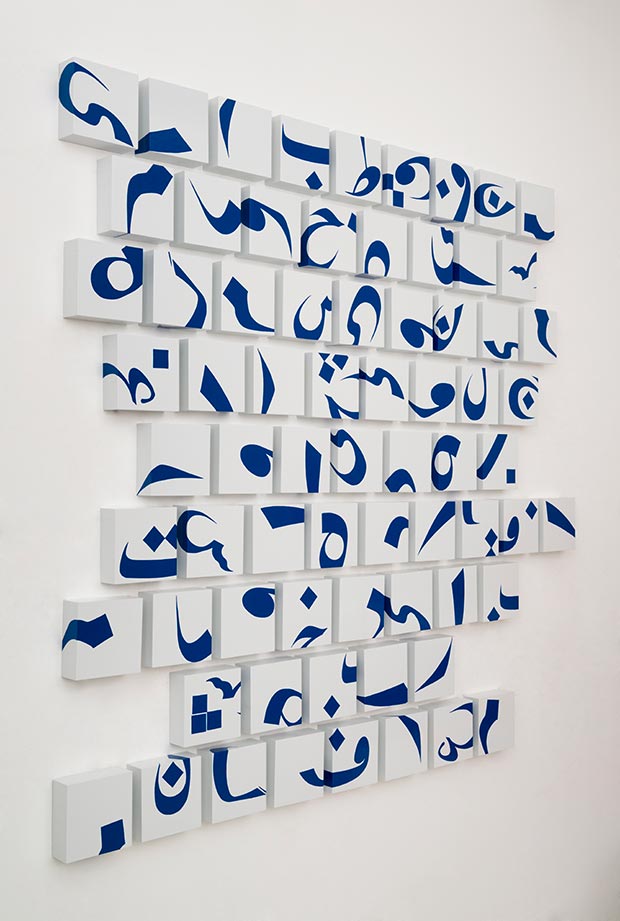 Pouran Jinchi / Untitled #1 (The Blind Owl Series), 2013, Enamel on Panel, side view / Courtesy of the Artist and The Third Line
Pouran Jinchi / Untitled #1 (The Blind Owl Series), 2013, Enamel on Panel, side view / Courtesy of the Artist and The Third Line
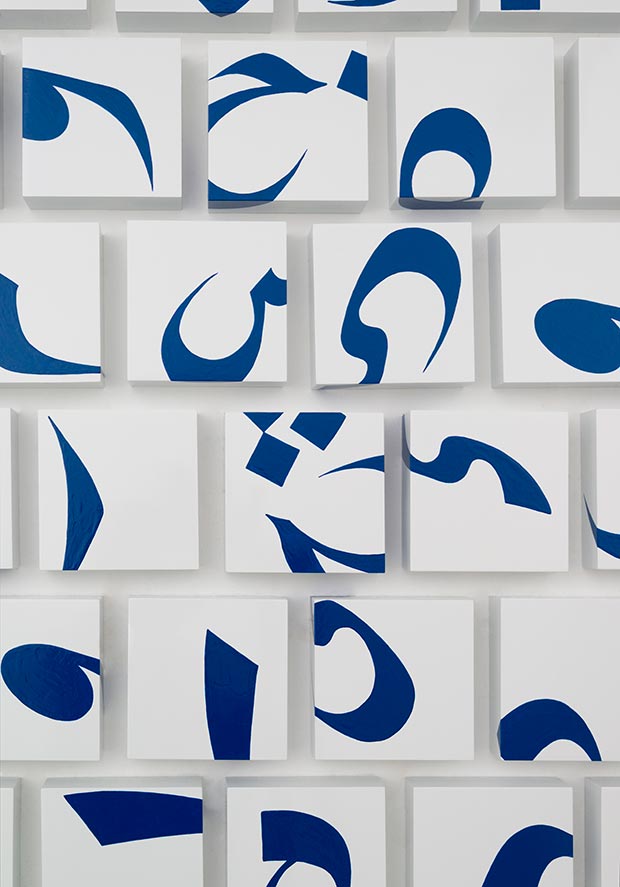 Pouran Jinchi / Untitled #1 (The Blind Owl Series), 2013, Enamel on Panel, detail / Courtesy of the Artist and The Third Line
Pouran Jinchi / Untitled #1 (The Blind Owl Series), 2013, Enamel on Panel, detail / Courtesy of the Artist and The Third Line
Yes, Internet has made that possible. We are very fortunate to be able to learn so much about the art scene in Iran or abroad so easily. I am old enough to know how that was not possible before and I am young enough to appreciate it.
I really just work most of the time and I really should go to more museums and openings, but it seems there is never enough time. There is always so many things happing in New York, it is hard to stay current.
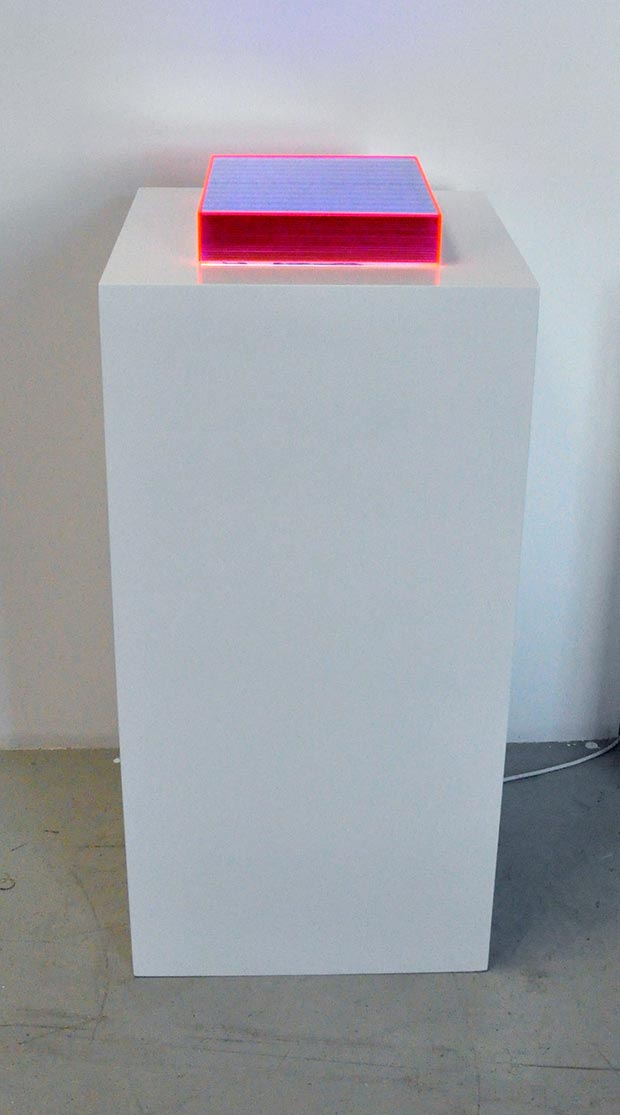 Pouran Jinchi / Untitled #2 (The Blind Owl Series), 2013, Plexiglass and permenant marker, 25.4x30.5x5.4 cm / Courtesy of the Artist and The Third Line
Pouran Jinchi / Untitled #2 (The Blind Owl Series), 2013, Plexiglass and permenant marker, 25.4x30.5x5.4 cm / Courtesy of the Artist and The Third Line
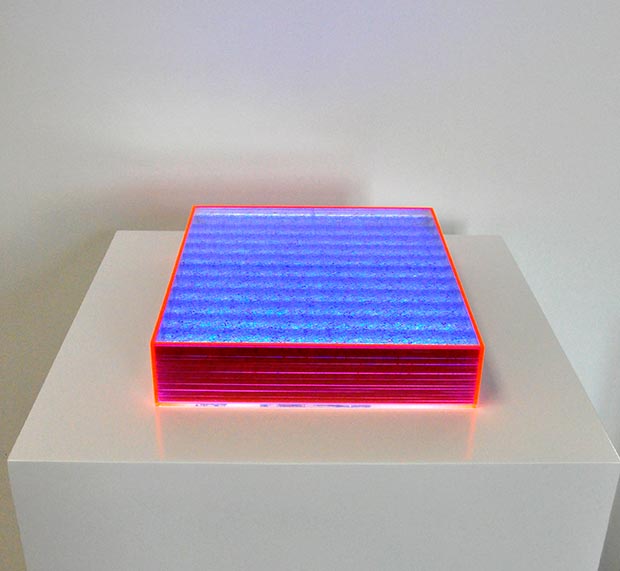 Pouran Jinchi / Untitled #2 (The Blind Owl Series), 2013, detail / Courtesy of the Artist and The Third Line
Pouran Jinchi / Untitled #2 (The Blind Owl Series), 2013, detail / Courtesy of the Artist and The Third Line
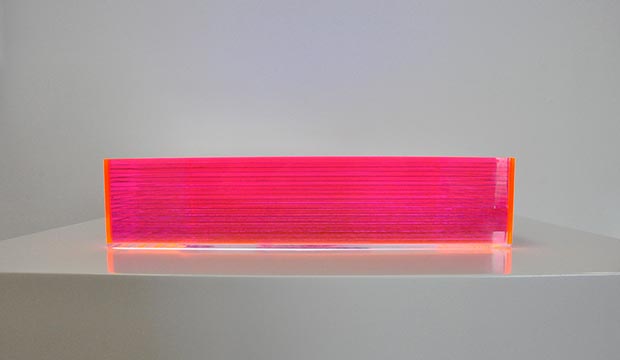 Pouran Jinchi / Untitled #2 (The Blind Owl Series), 2013, side view / Courtesy of the Artist and The Third Line
Pouran Jinchi / Untitled #2 (The Blind Owl Series), 2013, side view / Courtesy of the Artist and The Third Line
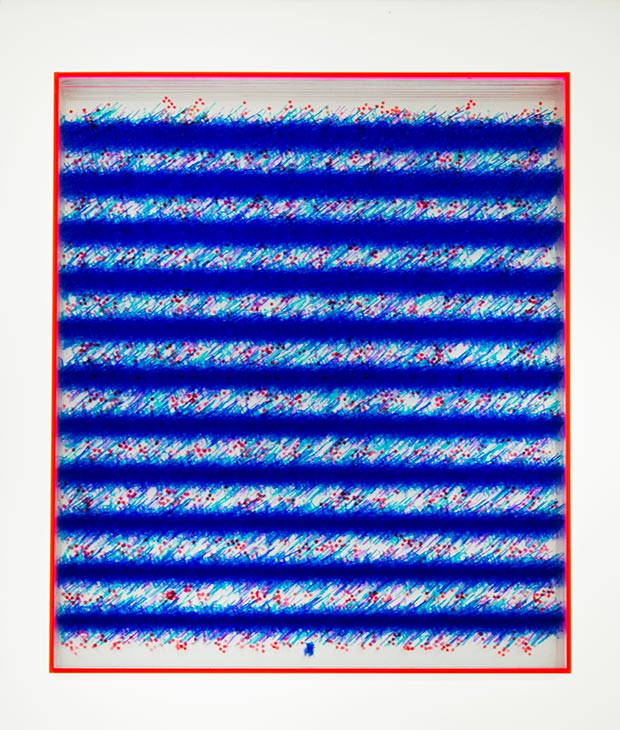 Pouran Jinchi / Untitled #2 (The Blind Owl Series), 2013, detail / Courtesy of the Artist and The Third Line
Pouran Jinchi / Untitled #2 (The Blind Owl Series), 2013, detail / Courtesy of the Artist and The Third Line
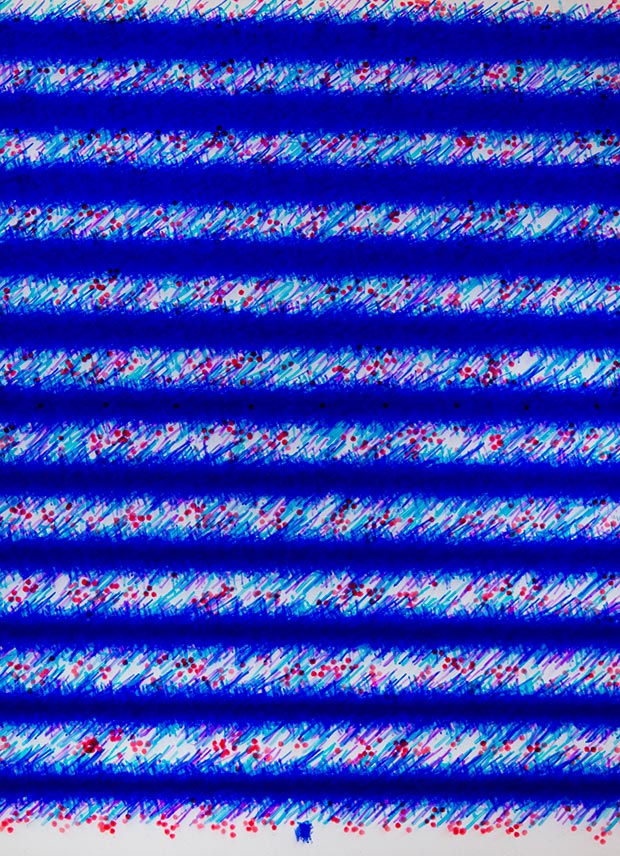 Pouran Jinchi / Untitled #2 (The Blind Owl Series), 2013, detail / Courtesy of the Artist and The Third Line
Pouran Jinchi / Untitled #2 (The Blind Owl Series), 2013, detail / Courtesy of the Artist and The Third Line
To take some time off and recharge.
My thanks for your interest in my art and hope I was able to answer all you questions.
Comments
Add a comment